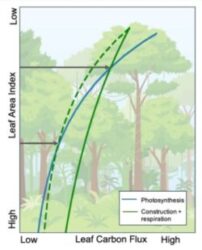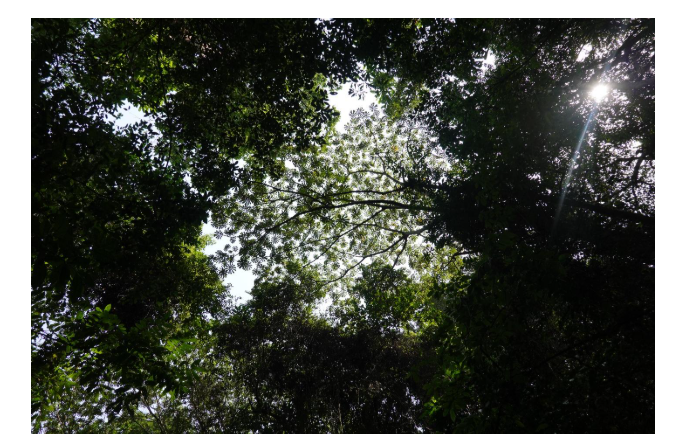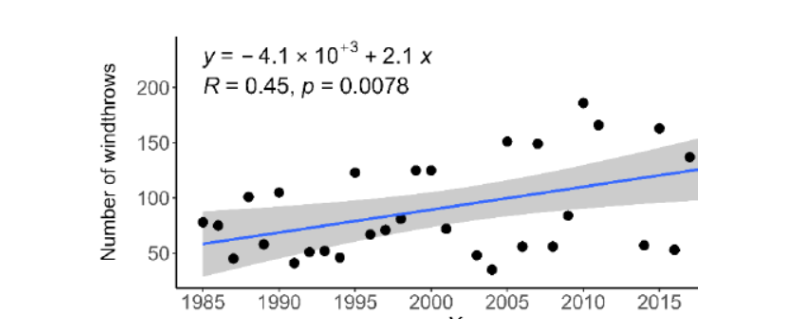The future of tropical forests matter to future climate.
NGEE-Tropics is advancing model predictions of tropical forest carbon cycle responses to a changing climate over the 21st Century.
Our Research
NGEE-Tropics focuses on the state-of-the-science measurements and model development most critical to projecting tropical forest carbon cycling and associated energy and water fluxes. Current Earth system models typically are simplistic in their representation of the processes controlling the tropical forest carbon cycling, and observational datasets to constrain model projections are insufficient, resulting in large uncertainties in projections of their responses to future environmental scenarios. In addition, many models are built in a way that makes comparing simulations with field data extremely challenging. NGEE-Tropics envisions a greatly improved predictive capacity for tropical forest responses and feedbacks to global change. This capacity ... Read More
To improve tropical forest representation in Earth system models (ESMs), NGEE-Tropics is carrying out field and lab studies to generate key data, and integrate diverse existing data with this new data. The resulting data products are valuable for model development, parameterization, and testing. The NGEE-Tropics Data Synthesis and Management Framework includes infrastructure for archiving project data collections, and for defining and building data synthesis and analysis products needed as model parameters and benchmarks. The FATES modeling efforts need meteorological-driven datasets generated through consistent QA/QC and gap-filling protocols for intercomparison of cross-site simulation results. In addition, key data for benchmarking such ... Read More
The NGEE Tropics project team selected sites for Phase 2 that are essential to attaining our goals and deliverables. Our Phase 2 work will build on infrastructure developed at Phase 1 pilot sites. We will also leverage extensive infrastructure and logistical support for additional Phase 2 sites with our international partners and collaborators. Developing FATES and ModEx from regional to continental perspectives requires defining the gradient change in the measured variables that represent key model drivers and establishing boundary conditions to evaluate the model’s ability to accurately simulate key emergent benchmarks. Puerto Rico offers an excellent regional testbed for exploring ... Read More
RFA1: Environmental effects on tree function, stress response, and mortality. How do drought and elevated temperature related to environmental change impact tree physiology and mortality? Phase 2 research will focus on advancing understanding of water sourcing, hydrodynamics, tree canopy exchange of CO2 and water, carbon storage, plant respiration, defense strategies, and damage associated with elevated tree mortality risks. RFA1 will provide new understanding and model representation of physiological processes that enable FATES to more accurately predict forest functional response, damage, and tree mortality as a response to drought and elevated temperature. Plant water sourcing. Using existing and new data collected ... Read More
RFA2: Forest structure and composition along environmental gradients. How do forest structure and composition vary in response to plant available water, soil fertility, and disturbance? Representing tropical forest structure and functional composition, and how they mediate responses to environment and disturbance from ecosystem to Earth-system scales are key innovations that FATES provides to E3SM. During Phase 2 the NGEE-Tropics team will focus on developing accurate representations of forest composition and functional diversity as they relate to water and nutrient availability, and disturbance regimes. To support this activity, we will investigate mechanisms which can lead to stable functional coexistence in FATES. ... Read More
RFA3: Tropical forests and coupled Earth system processes. How do precipitation recycling and the seasonal timing of precipitation respond to changes in forest structure and Earth’s environment? Over continental scales precipitation recycling, defined as the contribution of local evaporation to local precipitation, and the seasonal timing of precipitation are sensitive to changes in environmental forcing and forest structure. RFA3 explores and improves modeling of the role soil hydrology plays in plant response to environmental forcing, develops new data products to serve as model benchmarks, and implements fully coupled E3SM-FATES interactions at regional and global scales. Because of its strong sensitivities to ... Read More
Recent News



